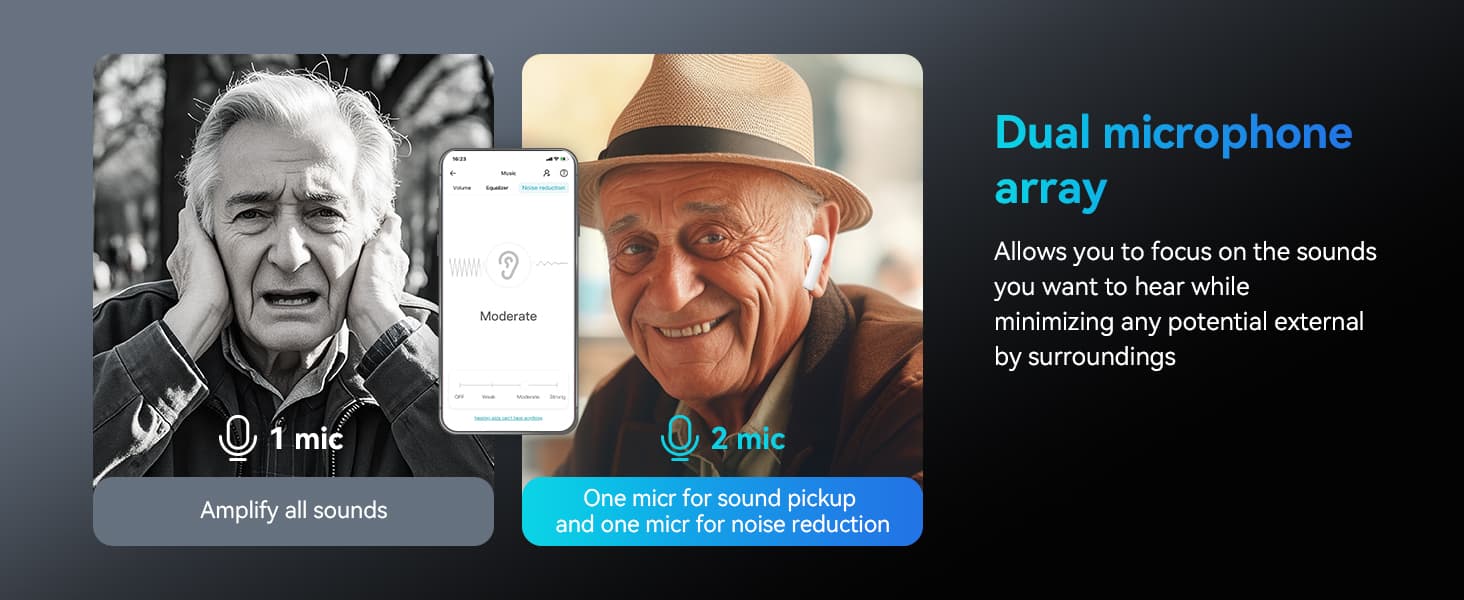Blog Detail
Table of Contents

How to Effectively Prevent Dementia
- Amy
- Oct 24, 2024
- 0 Comments
Cognitive impairment is an early manifestation of dementia, often manifested as memory and executive dysfunction. Studies have shown that hearing loss (HL) will reduce the willingness of the elderly to communicate, thereby affecting their cognitive function. In all dimensions of cognitive function, hearing loss has a negative impact on the overall cognitive function, orientation, immediate memory and language ability of the elderly. Alzheimer's disease is a degenerative disease of the central nervous system, with an insidious onset and a chronic and progressive course.
65% of the factors that cause the disease are beyond human control, and there are 9 factors that are considered to be human-changeable, accounting for 35% of the risk of disease. Let's take a look:
① Hearing loss in middle age - 9% of the risk
② Not completing secondary education - 8%
③ Smoking - 5%
④ Not treating depression early - 4%
⑤ Lack of physical activity - 3%
⑥ Social isolation - 2%
⑦ Hypertension - 2%
⑧ Obesity - 1%
⑨ Type 2 diabetes - 1%
(Source: Lancet Commission on dementia prevention, intervention and care)
Hearing loss in middle age will prevent hearing-impaired people from having a rich cognitive environment, and hearing loss is prone to social isolation and depression, both of which are controllable factors for dementia.
When the elderly have hearing loss, they should wear hearing aids as soon as possible to intervene and ensure their listening ability, and they should insist on wearing them, not "wearing them if they like". As the saying goes, "use it or lose it", the various centers of the cerebral cortex need to continue to maintain effective activity in order to slow down the occurrence of Alzheimer's disease.
Reasons to choose retekess rechargeable hearing aids:
1. Self-fitting OTC hearing aids prove comparable to professionally fitted
2. Lowest price for automatic custom settings with FDA-cleared hearing aids
3. Accuracy of hearing test results far exceeds that of hearing aids of the same price
4. Simple operation, multiple functions, support fine-tuning, noise reduction processing
5. Fast charging, 48 hours of battery life, easy Bluetooth connection
6. Easy and free returns within 30 days, 30 days of worry-free experience for better hearing
In addition, what else can we do?

① Regular exercise
Exercise can reduce the risk of dementia by 50%. For those who have already started to have cognitive problems, exercise can slow down the further deterioration of the disease.
Add strength or weight training to your weekly routine - these exercises not only exercise your muscles, but also help you keep your brain healthy. Weightlifting training does not only refer to weightlifting, hiking, dancing, jogging and walking can also be counted as weightlifting training.
As you age, proper balance and coordination exercises can help you stay agile and avoid falls. These exercises include Tai Chi, yoga, Pilates, etc.
② Healthy diet
Diabetes is closely related to Alzheimer's disease. Eat a light diet and eat less high-sugar and greasy foods. You can add some whole grains, vegetables, nuts, beans and other foods to your daily diet list.
Healthy tea drinking. A December 2016 study in the Journal of Nutrition, Health & Ageing showed that regular and consistent consumption of tea — whether black, green or oolong — was associated with a lower risk of dementia. The study suggests that tea’s benefits for the brain come from bioactive compounds in tea, such as catechins and theaflavins, which contain anti-inflammatory and antioxidant potential, as well as other brain-protective properties.
Supplement your diet.The body needs vitamins B3 and B6 to form neurotransmitters, making them essential for the healthy functioning of the nervous system and brain. Vitamin D is a powerful anti-inflammatory and immune-boosting nutrient that may help slow the onset and progression of dementia. Vitamin E has also been found to be helpful in preventing dementia-causing diseases, such as Alzheimer’s disease.
③ Stimulate your brain
Learn something new. Practice a musical instrument, learn a foreign language, read a good book, and so on to keep your brain stimulated and exercised.
Play strategy games and guessing games. Brain teasers and riddles can exercise your intelligence and train your brain to form and maintain cognitive associations. Crossword puzzles, board games, cards, Scrabble, and Sudoku are all good choices.
Break the routine. Eat with your non-dominant hand, take a new route home, and break an old habit.
④ Reduce stress
Continuous stress can take a toll on the brain and increase the risk of dementia.
Manage stress by consciously taking time to relax every day. For example, take a walk in the park, hang out with friends, etc.
Meditation. Meditation can increase protective tissue in the brain and reduce the hormone cortisol, which increases the risk of dementia.
Laugh more. Laughter can help the body fight stress. Socializing, laughing, playing, and activities help mobilize the brain and help prevent dementia.
⑤ Get a good night's sleep
Insufficient and interrupted sleep promote the accumulation of a certain protein in the brain, which can lead to memory impairment and Alzheimer's disease. Therefore, getting more deep sleep may clear the protein burden in the brain.
Establish a regular sleep schedule and make sleep a priority. If you are complained of snoring, you may need to be checked for sleep apnea, a potentially dangerous disease in which breathing is interrupted during sleep. Treating sleep apnea can greatly improve your sleep quality.
If insomnia is a problem, try exercising, establishing a relaxing bedtime ritual, or consulting a doctor.
In the above description, we can see that in addition to diet, social interaction and mentality are crucial in preventing Alzheimer's disease. So when you need others to repeat words and no longer hear background sounds in the environment, such as car horns in the distance, water drops, and the rustling of writing, you need to consider whether there is hearing loss.
Don't be ashamed of this phenomenon. First of all, it is very common, but many people don't realize it. Secondly, we can't ignore our health and quality of life in order to care about the opinions of others. For hearing loss, the sooner the treatment, the better. Wearing hearing aids can sometimes make people feel tired. Our products combined with APP will recommend suitable humanized modes based on scientific evaluation. Click here to learn about this professional otc hearing aid.






















Comments (0)